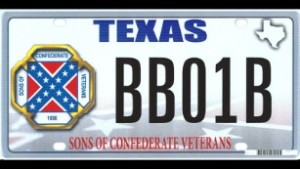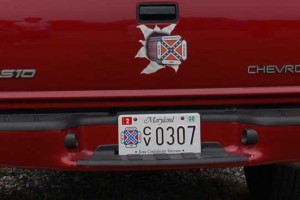 Is a license plate design a state action or personal speech? This question is at the heart of a dispute that the U.S. Supreme Court will begin considering today in a case arising from Texas, where a state board nixed a specialty license plate design (photo to left) sought by the Sons of Confederate Veterans (SCV), a private group, who then sued the state claiming their free speech rights had been infringed. Maryland approved the exact same plate design (see photo below).
Is a license plate design a state action or personal speech? This question is at the heart of a dispute that the U.S. Supreme Court will begin considering today in a case arising from Texas, where a state board nixed a specialty license plate design (photo to left) sought by the Sons of Confederate Veterans (SCV), a private group, who then sued the state claiming their free speech rights had been infringed. Maryland approved the exact same plate design (see photo below).
Although Texas barred this plate, Maryland allows it, because of a court ruling in favor of SCV. What if a private citizen then sued the state for issuing it? What would happen then? If a state can’t be compelled to issue a license plate requested by someone, does the state have a duty to deny a requested plate because it offends someone? These are complicated legal questions.
Generally speaking, a license plate is government property, even though you have to pay for it. You’re required to have it on your car to drive it on public roadways, and you’re not allowed to alter, deface, or obscure it. Its purpose is to make identifying your vehicle possible if you violate traffic (or other) laws and/or damage property or injure someone with your vehicle.
The money you pay for a license plate and the annual renewal stickers are fees for using public roadways, not a purchase of goods. You’re a licensed user, not the owner, of the license plate — similar to a software user who is sold a license conditioned on agreeing to the softwware licensor’s terms and conditions.
It should be obvious to everyone that restricting what messages a person can put on his/her car, and requiring the state to put a requested message on a state-issued license plate, are two very different things. Generally speaking, a state can’t limit an individual’s speech, but individuals shouldn’t be allowed to compel the state to speak for them.
 The burden on these individuals is slight. Even if their license plate design is disallowed, they can still put Confederate symbols and messages on their cars (see bottom photo). This case isn’t about that. It’s about whether they can force the state to put those symbols and messages on state-issued license plates. The answer should be a resounding “no.”
The burden on these individuals is slight. Even if their license plate design is disallowed, they can still put Confederate symbols and messages on their cars (see bottom photo). This case isn’t about that. It’s about whether they can force the state to put those symbols and messages on state-issued license plates. The answer should be a resounding “no.”
Suppose the Supreme Court concludes what’s on a state-issued license plate constitutes individual free speech. Then what? Will there be any boundaries at all, or must state motor vehicle agencies cater to all comers, including those who request vulgar or pornographic license plates? If SCV can compel the Texas DMV to issue the SCV plate, must it also issue a plate, on request, that says “FUCK SCV”? If one, why not the other? And if not, then how about “FCKSCV”? If there’s a line, where and how will DMVs draw it?
And in that case, should an individual who objects to a slogan on a state-issued license plate have a right to sue to keep the state’s message off his car? For example, what if a climate change activist registering a vehicle in Washington State doesn’t want “The Evergreen State” on his/her vehicle because the person wants to raise the public’s awareness that the planet is at risk of turning brown?
If the Court rules the wrong way on this, it’s not hard to visualize license plate flame wars springing up across the land, pitting racial and political antagonists, sports fans, and other social groupings against each other, which then could easily get out of hand in a Russian road rage sort of way. (If you don’t know what Russian road rage is like, go to You Tube and type in “Russian road rage,” and after watching a handful of those videos you’ll understand why Russia’s population — especially its young male population — is shrinking.)
Which brings us full circle to a car owner who, back in the birthing days of vanity license plates in the early 1970s, snuck this one past DMV censors: FCKNXN. When the bureaucrats figured it out, they revoked and recalled it.
